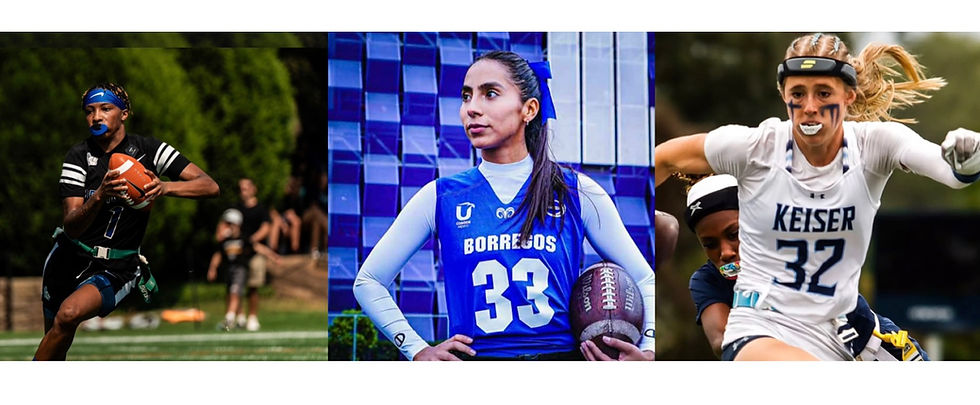NIL for All... Except High School Student Athletes
- Alex Castro
- Aug 4, 2021
- 3 min read
Updated: Oct 18, 2022
As many of us know, many student athletes across the nation have been profiting from the commercial use of their name, image, and likeness (NIL) as of July 1, 2021. This overdue policy amendment has allowed hundreds of thousands of student athletes enrolled in a postsecondary educational institution – college or university – to monetize their NIL. For years, the focus of NIL rights was shining on NCAA athletes, and ignoring the conversation of affording the same intellectual property rights for high school athletes (HS Athletes). Some of the most fundamental arguments against NCAA’s previous NIL policy rested on the idea that every student (non-athlete) enrolled in school has the right to profit from their NIL. Therefore, as a matter of public policy, every student athlete should enjoy that benefit similar to their peers and not be stripped of their rights of publicity simply because they play a sport for their school. Reasonably, since college athletes are permitted to monetize their NIL rights, then the same proponed arguments should equally apply to the NIL restrictions that govern the student athletes at the high school level.
Currently, the only state that expressly permits HS Athletes to monetize and profit from their NIL is California. Among the jurisdictions that have passed NIL legislation, the state legislature is either silent on the applicability of NIL rights to HS Athletes or it defers the issue to the bylaws or policies of the applicable high school athletic associations (HSAA). Conversely, there are a few states including Illinois, Mississippi, and Texas (arguably the largest state where HS Athletes could benefit from NIL) that go as far as explicitly prohibiting HS Athletes from entering into NIL agreements. Further, even if a HS Athlete is fortunate enough to live in a state that does not prohibit them from NIL activity, there is the red tape from HSAA that may prohibit or limit the types of activity that HS Athletes may engage in to remain eligible. Meanwhile, there are a number of state laws and HSAAs that are unclear or ambiguous on whether NIL activity is permitted.
With over 5 million followers across social media platforms, North Carolina high school basketball athlete Mikey Williams is projected to earn millions of dollars through endorsement deals after have recently signed with a sports management agency. Williams has been able to skirt the restrictive grips of the NC HSAA because he attends a private institution and plays for a program at an academy that is not part of the HSAA and thus not prohibited from engaging in NIL opportunities. For the majority of the HS Athletes whose situation is not as fortunate as Williams’, they must comply by the HSAA or state laws such as Texas high school football athlete Quinn Ewers who is a five-star quarterback recruit committed to the Ohio State University. However, Ewers officially announced on August 2, 2021 that he will enroll into Ohio State early and forego his senior year in high school. Such a move allows Ewers to avoid Texas University Interscholastic Leagues’ NIL prohibition by graduating high school early allowing him to engage in NIL opportunities that could yield earnings upwards of seven-figures.

Source: https://twitter.com/QuinnEwers/status/1422237898989088768/photo/1
In light of recent high-profile HS Athletes using alternative avenues to capitalize NIL opportunities, the HSAAs may be sharing the same hot seat that the NCAA once endured. Although the overall impact of NIL for high schools may not amount to the level of the NCAA, due to the difference in economic markets there will be regional and local areas in states where high school football is an integral part of communities (e.g. California, Florida, and Texas). With HS Athletes finding ways to work around the HSAAs NIL restrictions, the implications behind NIL limitations may force the highly recruited HS Athletes to make drastic decisions that may negatively impact the local small-business economy. Such decisions could resemble the Williams’ or Ewers’ route, whereas other HS Athletes may decide to move to a NIL-friendly state or avoid the bureaucracy of traditional education institutions and join an organization such as Overtime Elite.
Unfortunately, it may be awhile before we start seeing any progress on the NIL front for HS Athletes considering the optics and public policy against young(er) teenagers being exposed to shady characters, legally binding contracts and vulnerability to unfair terms. Additionally, there are other complications with both legal and moral aspects that are tied to business deals involving brands and minors. However, it’s almost certain that there will be a tipping point where public policy that supports strict NIL governance for HS Athletes will be outweighed by the negative effects in level of competition, prestige and economic opportunity lost due to the same hill that the NCAA was once ready to die on.
Photo: CBS Sports
You can find Alex Castro on Instagram @_castro_alex and Twitter @castro_alex__







EPS Machine EPS Cutting…
EPS Machine Eps Raw…
EPS Machine EPS Recycling…
EPS Machine EPS Mould;
EPS Machine EPS Block…
EPP Machine EPP Shape…
EPTU Machine ETPU Moulding…
EPS Machine Aging Silo…
EPTU Machine ETPU Moulding…
EPS Machine EPS and…
EPS Machine EPS and…
AEON MINING AEON MINING
AEON MINING AEON MINING
KSD Miner KSD Miner
KSD Miner KSD Miner
BCH Miner BCH Miner
BCH Miner BCH Miner
EPS Machine EPS Cutting…
EPS Machine Eps Raw…
EPS Machine EPS Recycling…
EPS Machine EPS Mould;
EPS Machine EPS Block…
EPP Machine EPP Shape…
EPTU Machine ETPU Moulding…
EPS Machine Aging Silo…
EPTU Machine ETPU Moulding…
EPS Machine EPS and…
EPS Machine EPS and…
AEON MINING AEON MINING
AEON MINING AEON MINING
KSD Miner KSD Miner
KSD Miner KSD Miner
BCH Miner BCH Miner
BCH Miner BCH Miner